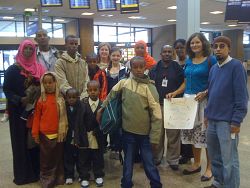'Welcome the Stranger' assists CCS in establishing refugees

SALT LAKE CITY – Catholic Community Services (CCS) is reintroducing the Welcome the Stranger program into its Immigration and Refugee Resettlement program with the help of the Diocese of Salt Lake City.
"We have so many people who are new to the diocese, and it’s important to welcome them into our midst," said the Most Rev. John C. Wester, bishop of Salt Lake City. "It’s more than just the immigrants, with our mobile society people are constantly moving from place to place and human beings have a need to be accepted," he said. "So it is really important that we welcome each other."
The diocese began the Welcome the Stranger program as an initiative of the United States Council of Catholic Bishops, said Aden Batar, director of CCS Immigration and Resettlement. "Parishioners were asked to welcome refugees, immigrants and people on the move to help them feel welcome, providing whatever support they needed," he said. "The Porticus fund (a one-year grant received this year) has allowed us to start the program again. Now we need parishes to adopt families that are resettled within their areas."
Saint John the Baptist is the first parish to begin the program and welcomed a family of 10 from Somalia Oct. 15. They had been in a refugee camp in Ethiopia for 20 years.
"We instantly bonded with the Muse family," said Kathleen Mahoney, a St. John the Baptist parishioner. "Meeting them at the airport was like meeting family."
"I think the Welcome the Stranger program is a real important initiative and I think it is part of living out the Gospel, ‘I was a stranger and you welcomed me,’" said Monsignor Terence Moore, pastor of St. John the Baptist Parish and former CCS executive director. "People who are refugees have suffered so much and are so vulnerable. They come with a history of persecution or discrimination, so giving them a new start is so important and so satisfying. It’s been energizing for our parish."
With the involvement of the parishes, the refugee families will get a lot of support for their transition into the United States. The parish volunteers can help them learn English, collect donations to furnish their apartments and adjust to their new lifestyle. The main objective of the resettlement program is to help the refugee families become self sufficient within the first six months of their resettlement. "We are asking volunteers to provide two to three hours three times each week plus time on the weekends," said Janet Healy, CCS volunteer coordinator. "The volunteers can remain friends with the families, but we want them to move on to the next family after six months.""Volunteers need to be there every couple of days in the beginning because they need so much support," said Mahoney. "It’s a steep learning curve the families go through to learn about their new appliances and what goes in the cupboard and in the fridge. We have labeled everything and we have still found food that should be in the fridge in the cupboard or under the sink or on fridge. They want so badly to learn and they are learning quickly.
"We’ve learned so much from them about generosity and about giving back," she added. "It’s such a humbling experience to sit and share a meal with them or eat out of the same plate. It’s neat to see things through their eyes. They are so excited about getting an education."
"We are bringing these refugee families to Utah because we think they deserve a second chance," said Batar. "We don’t want to warehouse them in the refugee camps. There are already 14 million refugees and every year more flee their home countries. Legally we cannot prevent what is happening in their countries, but we can give them a new life of hope."
© Copyright 2025 The Diocese of Salt Lake City. All rights reserved.

Stay Connected With Us